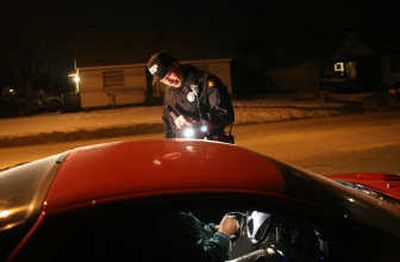Judges toss DUI evidence

Dozens, possibly hundreds, of breathalyzer tests taken in 2007 will not be admissible as evidence in Spokane courts on pending drunken driving charges.
Spokane District Court judges who preside over Spokane County DUI cases based their decision on other jurisdictions’ findings and an audit of the Washington State Patrol toxicology lab done last year that resulted in the resignations of its manager, Anne Marie Gordon, and the head of WSP’s forensic laboratory, Dr. Barry Logan.
Among the findings: Breathalyzer tests were unreliable because of multiple problems at the lab, including incorrectly calibrated machines, switched samples, and the former lab manager saying she’d checked equipment for accuracy when she hadn’t, according to a court document.
Deputy Spokane County Prosecutor Brian O’Brien, who prosecutes county and state drunken driving cases, said the question complicates cases in which the breathalyzer results are the only evidence. “Defense attorneys across the state have been asking judges to suppress the breath tests,” he said.
But if there’s other evidence, such as an officer witnessing a car weaving on the road or a driver stumbling when they got out of a car, it’s not going to have as much of an effect, O’Brien said.
The exclusion of breath tests affects more than 100 pending cases in his office, he said. Annually, the county receives more than 1,000 DUI complaints from the WSP, the Spokane County Sheriff’s Office and some small municipal police agencies. City of Spokane cases are handled separately.
The judges’ ruling follows similar decisions in several other Washington counties, including King County. As recently as last month, a panel of Seattle judges determined the breath-test machines were still unreliable, according to a May 21 article in the Seattle Times.
Josh Maurer, a Spokane defense attorney, said blood alcohol content evidence “is so monumental … that without that it hurts a case significantly,” adding he’s had at least 10 clients who have been able to negotiate a lesser charge because breathalyzer evidence has been suppressed.
For a defense attorney, “it makes it easier to decide to take a client’s case to trial, because you know the BAC evidence isn’t coming in,” Maurer said. “BAC evidence has been around for so long that jurors rely on that coming in. They take it as the word of God, when in actuality there are a lot of things that can go wrong … human error and computer error.”
So far, judges who preside over drunken driving cases in the city of Spokane have made rulings on a case-by-case basis, said Shelley Szambelan, an assistant city prosecutor.
However, several hearings to suppress breathalyzer tests in city cases are scheduled for mid-July, she said, “which should give some guidance on how the BACs will or will not be used in municipal DUI prosecutions.”